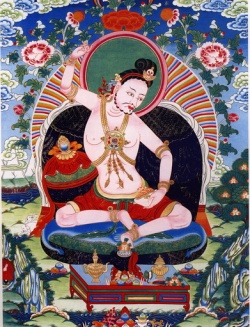Difference between revisions of "Jñanasrimitra"
| (2 intermediate revisions by the same user not shown) | |||
| Line 1: | Line 1: | ||
[[File:05ds.jpg|thumb|250px|]] | [[File:05ds.jpg|thumb|250px|]] | ||
| − | |||
| − | |||
| − | [[Ratnakirti]] was a personal pupil of [[Jñanasrimitra]]. In the [[Vyaptinirnaya]] he deals mainly with the same questions as treated by his [[teacher]] in the [[Vyapticarca]], which he uses as a model for his work. Apart from some newly introduced discussions, the most striking differences to the [[Vyapticarca]] lie in the more tense structuring of the text, a more lucid presentation of the different arguments, and in a shift of {{Wiki|emphasis}} from proving one's own opinion to refusing the opinions advocated by opponents. | + | |
| + | |||
| + | |||
| + | |||
| + | |||
| + | [[Jñanasrimitra]] is an outstanding representative of the late phase of the so-called {{Wiki|logico-epistemological}} school of [[Buddhism in India]], which goes back to [[Dignaga]] and [[Dharmakirti]]. In a series of {{Wiki|essays}} he discusses the central topics of his [[tradition]]. | ||
| + | |||
| + | Being fully acquainted with the {{Wiki|literature}} of rival [[Buddhist]] and [[non-Buddhist]] schools, [[Jñanasrimitra]] does not only give original answers to [[philosophical]] questions, but also provides us with a large amount of [[information]] on the historical [[development]] of the related discussions. | ||
| + | |||
| + | In the [[Vyapticarca]], [[Jñanasrimitra]] deals with the possibility of a [[constant]] and therefore reliable relationship between things such as smoke and [[fire]], the [[Wikipedia:concept|concepts]] of which are intended to be used as the [[logical reason]] and the consequence in an {{Wiki|inference}}. | ||
| + | |||
| + | Besides dealing with the more technical aspects of different procedures of ascertaining the said relationship, he also discusses topics of a more general [[philosophical]] [[interest]], for instance about the [[reality]] of general properties or about the {{Wiki|status}} of things useful for {{Wiki|practical}} goals and their capacity of becoming an [[object]] of [[cognition]]. | ||
| + | |||
| + | [[Ratnakirti]] was a personal pupil of [[Jñanasrimitra]]. In the [[Vyaptinirnaya]] he deals mainly with the same questions as treated by his [[teacher]] in the [[Vyapticarca]], which he uses as a model for his work. | ||
| + | |||
| + | Apart from some newly introduced discussions, the most striking differences to the [[Vyapticarca]] lie in the more tense structuring of the text, a more lucid presentation of the different arguments, and in a shift of {{Wiki|emphasis}} from proving one's [[own]] opinion to refusing the opinions advocated by opponents. | ||
</poem> | </poem> | ||
| + | |||
| + | |||
| + | |||
{{R}} | {{R}} | ||
| − | [ | + | [[Category:Buddhist Terms]] |
| + | [[Category:Buddhism]] | ||
| + | [[Category:Tibetan Buddhism]] | ||
| + | [[Category:Buddhist Philosophy]] | ||
[[Category:Buddhist philosophers]] | [[Category:Buddhist philosophers]] | ||
| + | [[Category:Jñanasrimitra]] | ||
Latest revision as of 18:24, 19 May 2023
Jñanasrimitra is an outstanding representative of the late phase of the so-called logico-epistemological school of Buddhism in India, which goes back to Dignaga and Dharmakirti. In a series of essays he discusses the central topics of his tradition.
Being fully acquainted with the literature of rival Buddhist and non-Buddhist schools, Jñanasrimitra does not only give original answers to philosophical questions, but also provides us with a large amount of information on the historical development of the related discussions.
In the Vyapticarca, Jñanasrimitra deals with the possibility of a constant and therefore reliable relationship between things such as smoke and fire, the concepts of which are intended to be used as the logical reason and the consequence in an inference.
Besides dealing with the more technical aspects of different procedures of ascertaining the said relationship, he also discusses topics of a more general philosophical interest, for instance about the reality of general properties or about the status of things useful for practical goals and their capacity of becoming an object of cognition.
Ratnakirti was a personal pupil of Jñanasrimitra. In the Vyaptinirnaya he deals mainly with the same questions as treated by his teacher in the Vyapticarca, which he uses as a model for his work.
Apart from some newly introduced discussions, the most striking differences to the Vyapticarca lie in the more tense structuring of the text, a more lucid presentation of the different arguments, and in a shift of emphasis from proving one's own opinion to refusing the opinions advocated by opponents. </poem>
